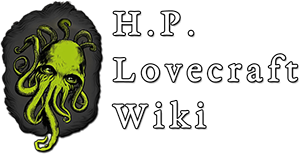No edit summary |
m (Infobox and contents) |
||
| Line 1: | Line 1: | ||
| + | {{Infobox story |
||
| − | <blockquote> |
||
| + | |image = Lovecraft circle Seal.jpg |
||
| ⚫ | |||
| + | |author = Clark Ashton Smith |
||
| − | </blockquote> |
||
| + | |genre = Religious, occult, philosophy |
||
| − | |||
| + | |release = 8th Century |
||
| + | }} |
||
| ⚫ | |||
The ''Book of Eibon'', or ''Liber Ivonis'' or ''Livre d'Eibon'', is attributed to [[Clark Ashton Smith]]. It appears in a number of Lovecraft's stories, such as "[[The Haunter Of The Dark]]" (''Liber Ivonis''), "[[Dreams in the Witch-House]]" (''Book of Eibon'') and "[[The Shadow Out of Time]]" (''Book of Eibon''). |
The ''Book of Eibon'', or ''Liber Ivonis'' or ''Livre d'Eibon'', is attributed to [[Clark Ashton Smith]]. It appears in a number of Lovecraft's stories, such as "[[The Haunter Of The Dark]]" (''Liber Ivonis''), "[[Dreams in the Witch-House]]" (''Book of Eibon'') and "[[The Shadow Out of Time]]" (''Book of Eibon''). |
||
The book was passed down by secret cults to the present day. Never printed until the 20th century, there are many editions which vary widely, from tablets to scrolls. Editions include: the Kishite Version; The Punic (1600 B.C.); The Greek Edition; The Latin ''Liber Ivonis'' (10th-11th century); ''Livre d'Ivon'' (13th century); and the only printed version, the Adkins and Jones edition of the Latin text (A.D.1937). A key text in the Tsathogguan Cycle. |
The book was passed down by secret cults to the present day. Never printed until the 20th century, there are many editions which vary widely, from tablets to scrolls. Editions include: the Kishite Version; The Punic (1600 B.C.); The Greek Edition; The Latin ''Liber Ivonis'' (10th-11th century); ''Livre d'Ivon'' (13th century); and the only printed version, the Adkins and Jones edition of the Latin text (A.D.1937). A key text in the Tsathogguan Cycle. |
||
| + | ==Contents== |
||
| + | Among other topics, the book includes: |
||
| + | |||
| + | *A spell for the emanation of Yoth that requires a child's blood.<ref>"The Man of Stone", H.P. Lovecraft</ref> |
||
| + | *A method of giving people the Green Decay.<ref>"The Man of Stone", H.P. Lovecraft</ref> |
||
| + | ==References== |
||
| + | <references/> |
||
{{stub}} |
{{stub}} |
||
{{DEFAULTSORT:Book of Eibon}} |
{{DEFAULTSORT:Book of Eibon}} |
||
Revision as of 11:15, 15 June 2018
| “ | . . . The Book of Eibon, that strangest and rarest of occult forgotten volumes ... is said to have come down through a series of manifold translations from a prehistoric original written in the lost language of Hyperborea. | „ | |
| ~ Clark Ashton Smith, "Ubbo-Sathla" |
The Book of Eibon, or Liber Ivonis or Livre d'Eibon, is attributed to Clark Ashton Smith. It appears in a number of Lovecraft's stories, such as "The Haunter Of The Dark" (Liber Ivonis), "Dreams in the Witch-House" (Book of Eibon) and "The Shadow Out of Time" (Book of Eibon).
The book was passed down by secret cults to the present day. Never printed until the 20th century, there are many editions which vary widely, from tablets to scrolls. Editions include: the Kishite Version; The Punic (1600 B.C.); The Greek Edition; The Latin Liber Ivonis (10th-11th century); Livre d'Ivon (13th century); and the only printed version, the Adkins and Jones edition of the Latin text (A.D.1937). A key text in the Tsathogguan Cycle.
Contents
Among other topics, the book includes:
- A spell for the emanation of Yoth that requires a child's blood.[1]
- A method of giving people the Green Decay.[2]
